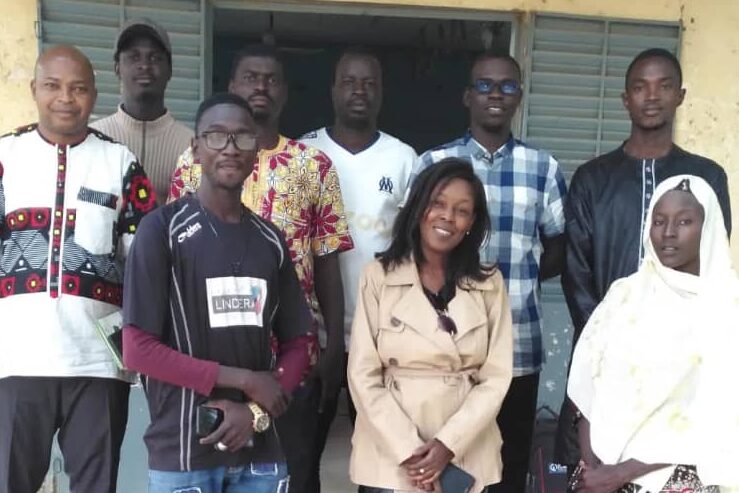Through COREWO (COnvergence REsearch WOrkshops), we explore convergence research to improve the lives of displaced and host populations in Cameroon
Can insights about the sociolinguistic life of displaced populations in Cameroon contribute to convergence research addressing their needs?
This is a question we kept asking ourselves over the last few years, during which KPAAM-CAM focused on the endangered languages spoken by displaced communities in Cameroon’s Littoral, West, and Far-North regions.
What is “convergence research”?
Convergence research is a means of solving research problems, especially those connected to or arising from societal needs. It has two primary characteristics:
- It is driven by a specific and compelling problem, regardless of its disciplinary nature or whether it arises from deep scientific questions or grave societal needs.
- It shows deep integration across disciplines. Research becomes convergent when intellectually diverse researchers find effective ways to communicate across disciplines in the pursuit of a common research challenge. The success of this process—and the impact of the solutions developed—depends on the extent to which participants’ knowledge, theories, methods, data, and research communities intertwine and integrate.
What is COREWO?
COREWO (COnvergence REsearch WOrkshops) is a sub-project of KPAAM-CAM that has two incremental goals:
- develop innovative approaches for structuring cross-disciplinary dialog by supporting explorations in this domain among Cameroonian academics, professionals, and communities;
- through this dialog, translate scientific knowledge into actionable solutions addressing pressing societal challenges among both displaced and host populations in Cameroon.
Building on the team’s longstanding commitment to cross-disciplinary research, COREWO has expanded this vision by engaging approximately thirty additional Cameroonian researchers and several international experts, taking our collaborative efforts to a new level. We have established five Study Groups, each with a unique cross-disciplinary focus that leverages the strengths of our local network, the expertise of the local university, or a combination of both. Here is a list of our Study Groups and their members.
- University of Bamenda
- Linguistics: Esther Phubon Chie, Levi Ekwa Mokake
- Agricultural Science: Aziwo Tatanji Niba
- Environmental Engineering: Lumnwi Modeste
- Geology: Njinto Kwankam Florence, Lionel Takem Nkwanyang
- University of Buea
- Linguistics: Atindogbe Gratien G., Ojong Rachel Diba
- Performing Arts: Taku Victor Jong, Toh Raphael
- Public Health: Ginyu Innocentia Kwalar, Fon Honoré Jam
- Peace, Mediation and Conflict Resolution: Noela Mesanga Lambe Ngoisa, Ayang Kaina Joseph
- University of Dschang
- Linguistics: Kouesso Jean Romain, Djoumene Kuete Juvelos
- Communication Studies: Pangop Kameni Alain Cyr, Mouthé Gildas
- Psychology: Messanga Adolphe Gustave, Taffo Nemboue Willy
- Geography: Lémougué Josephine, Donfack Olivier
- University of Maroua
- Linguistics: Amina Goron, Ali Emat Bachir, Avodo Avodo Joseph
- Sociology: Koumai Müller, Dourmaissou Armel
- Economics: Douswé Benoît, Anassangka Haman Haman, Tchaltouang Constant
- University of Yaounde 1
- Linguistics: Florence TABE, OUSMANOU
- Anthropology: Evans KAH, Exodus TIKERE MOFFOR,
- Environmental Engineering: Samuel KAISSASSOU
All the Study Groups met for the first time on November 18, 2024 and are actively discussing pressing societal needs affecting both displaced and host populations in and around their physical hub. Some are already collecting novel data specifically for the purpose of this sub-project, like the Maroua Study Group, which organized a meeting with two young refugees from the UNHCR camp of Minawao (see photo below).

Each Study Group will develop a preliminary document outlining a specific, compelling problem, accompanied by open questions, areas requiring deeper understanding of certain processes, and suggestions for COREWO International Experts.
Who are the COREWO International Experts?
A key element of the project involves inviting researchers, scholars, or people otherwise experienced in the domain of forcible displacement and hosting to contribute to the COREWO conversations. These International Experts will engage by recording a 45-60 minute lecture in response to the preliminary document produced by one or more Study Groups. These lectures are designed to address the identified challenges and stimulate further thinking. Following the lectures, Study Groups will create follow-up documents to refine their understanding and questions, leading to live Q&A sessions with the Experts (International Experts are currently being selected).
COREWO next steps
This iterative process, blending asynchronous and synchronous dialogue, will culminate in each Study Group producing a comprehensive “Detailed Study Group Document.” These documents represent the intellectual contributions and collaborative insights that each Study Group will present at the COREWO closing conference, scheduled to be held at the University of Dschang in late March 2025. This conference will showcase the outcomes of this innovative and interdisciplinary exchange, driving actionable solutions to pressing issues.